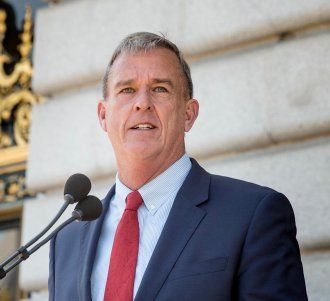AIDS at 40: ‘Those Our Nation Values Least, Suffer Most’
This story is one in a series of first-person perspectives from those who are working on the frontlines to better understand, treat and prevent transmission of HIV and AIDS as well as COVID-19. You can read more about the 40 years of AIDS in SF and how it has shaped the COVID-19 response.

Jeff Sheehy
Forty years after the U.S. Centers for Disease Control and Prevention (CDC) first reported HIV/AIDS cases and amidst the COVID-19 pandemic, emotion overwhelms reason.
Recalling the early days, I am haunted by the faces of young friends and lovers who I came out with who stumbled from the dance floor to their death beds. I remember the agony of a friend I helped take care of in the late ’80s, whose Kaposi’s Sarcoma blistery lesions manifested first, agonizingly, in his stomach and intestines before proceeding to his esophagus followed finally by the telltale stigmata marking his face.
In the ’90s, I can still feel the hope when the “cocktails” literally lifted friends out of wheelchairs and I first started taking antitretrovirals. But the drumbeat of death has never stopped and longterm survivors struggle with aging and trauma and their deaths too often resemble those in the early days, alone and neglected.
And now there is COVID-19 – why must the world experience pandemics when America is led by imbecilic presidents who ignore science and are willing to let countless numbers die needlessly?
While we have made incredible progress in advancing science against infectious agents, we have barely moved the needle when it comes to addressing who gets sick and who dies.
Ironically, AIDS created public health and scientific infrastructure that has kept COVID-19 from spiraling completely out of control and has enabled medical advances, such as vaccines and public health campaigns of varying degrees of effectiveness, to slow its spread.
Now it is time to take stock and recognize failures that span both pandemics. Once again, Americans think only of ourselves with just a passing nod to the devastation wrought in countries that cannot even hope to get lifesaving products developed and distributed in the U.S. Will it take another decade, like with antiretrovirals, for affordable vaccines to be made available?
And like HIV, will it come so late that those countries will spend additional decades trying to catch up? And will be after millions have died, like AIDS where 33 million have died to date?
More must be done. Forty years into the HIV/AIDS pandemic, with medications that can restore a person to health and prevent their ability to transmit and a pill that protects people from infection, 1.7 million people were newly diagnosed with HIV just last year.
In America, it is shameful that racial and ethnic disparities found in the statistics for risk for and death from COVID-19 so closely mirror those for HIV? Black Americans make up 42 percent of new HIV infections, Latinx Americans 27 percent. And before we pat ourselves on the back for faring better in San Francisco, Latinx San Franciscans and Black San Franciscans make up 38 percent and 20 percent of new infections, respectively, according to the latest report – well above their percentage of the population.
While we have made incredible progress in advancing science against infectious agents, we have barely moved the needle when it comes to addressing who gets sick and who dies. Those our nation values least, suffer most.
After 40 years, AIDS is far from being over. I fear COVID-19 will follow a similar trajectory and those who are considered the least among us will be struggling with both pandemics for decades to come while those with wealth and power will see this as a passing blip that was challenging, but surmountable due to advanced medical technology and privilege.
I think some may mark this day by congratulating ourselves on how far we have come. For me, I am humbled and shamed by how far we still have to go.
Jeff Sheehy is a longtime activist who served as former San Francisco Mayor Gavin Newsom’s HIV/AIDS adviser, a San Francisco Supervisor and communications director for the UCSF AIDS Research Institute. He was also a founding member of the Steering Committee of San Francisco’s Getting to Zero Consortium.
40 Years of AIDS in SF
Learn about UCSF’s four decades of work in HIV and AIDS, and how it has informed our response to the COVID-19 pandemic.
